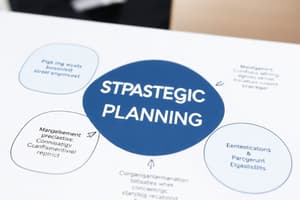Podcast
Questions and Answers
What is the primary purpose of planning in management?
What is the primary purpose of planning in management?
- To eliminate the need for decision-making
- To focus solely on short-term profits
- To create a rigid structure that cannot adapt to change
- To provide a clear path towards achieving objectives (correct)
Which type of planning is specifically concerned with day-to-day operations?
Which type of planning is specifically concerned with day-to-day operations?
- Tactical Planning
- Contingency Planning
- Operational Planning (correct)
- Strategic Planning
What is a key characteristic of effective planning?
What is a key characteristic of effective planning?
- Exclusivity of stakeholder input
- Inflexibility to adapt
- Realistic based on accurate data (correct)
- Ambiguity in objectives
What does contingency planning involve?
What does contingency planning involve?
Which of the following is NOT a step in the planning process?
Which of the following is NOT a step in the planning process?
Which tool is commonly used for analyzing internal and external factors affecting an organization?
Which tool is commonly used for analyzing internal and external factors affecting an organization?
Who is primarily involved in tactical planning?
Who is primarily involved in tactical planning?
Which approach helps in scheduling project timelines effectively?
Which approach helps in scheduling project timelines effectively?
What is the primary focus of organizing in management?
What is the primary focus of organizing in management?
Which function of management emphasizes the importance of communication?
Which function of management emphasizes the importance of communication?
What does the controlling function involve in management?
What does the controlling function involve in management?
Which of the following is a key aspect of coordination in management?
Which of the following is a key aspect of coordination in management?
In the context of management, what does sensitivity refer to?
In the context of management, what does sensitivity refer to?
Which function of management involves analyzing options and assessing risks?
Which function of management involves analyzing options and assessing risks?
What is the focus of performance evaluation in management?
What is the focus of performance evaluation in management?
Which of the following describes a key component of planning in management?
Which of the following describes a key component of planning in management?
Flashcards are hidden until you start studying
Study Notes
Principles of Management: Planning
-
Definition of Planning
- Process of setting objectives and determining a course of action for achieving those objectives.
-
Importance of Planning
- Provides direction: Establishes a clear path to follow.
- Reduces uncertainty: Anticipates potential challenges and prepares responses.
- Promotes efficiency: Optimizes resource use by outlining the best ways to achieve goals.
- Facilitates decision-making: Guides leaders in making informed choices.
- Enhances coordination: Aligns activities across different parts of the organization.
-
Types of Planning
- Strategic Planning
- Long-term, focuses on overall goals and direction.
- Involves top management and sets the framework for operational plans.
- Tactical Planning
- Shorter-term, focuses on translating strategic goals into specific actions.
- Involves middle management and addresses how to allocate resources effectively.
- Operational Planning
- Very short-term, details the day-to-day operations.
- Involves lower management, focuses on routine tasks and processes.
- Contingency Planning
- Preparing for unexpected events or crises.
- Involves creating alternative plans to address potential disruptions.
- Strategic Planning
-
Steps in the Planning Process
- Setting Objectives
- Define clear, measurable goals.
- Identifying Resources
- Assess available resources and capabilities.
- Developing Strategies
- Outline strategies to achieve objectives efficiently.
- Implementation
- Execute the plan by assigning tasks and responsibilities.
- Monitoring and Evaluation
- Regularly review progress and make adjustments as necessary.
- Setting Objectives
-
Key Characteristics of Effective Planning
- Clear objectives: Specific, measurable, attainable, relevant, time-bound (SMART).
- Flexibility: Ability to adapt to changing circumstances.
- Realistic: Based on accurate data and analysis.
- Inclusive: Engaging stakeholders in the planning process.
-
Tools and Techniques for Planning
- SWOT Analysis (Strengths, Weaknesses, Opportunities, Threats)
- PEST Analysis (Political, Economic, Social, Technological)
- Gantt Charts for project scheduling.
- Budgeting for resource allocation.
Understanding these principles of planning is essential for effective management and achieving organizational success.
Definition of Planning
- Planning involves setting objectives and determining the actions needed to achieve them.
Importance of Planning
- Provides direction by establishing a clear path to follow.
- Reduces uncertainty by anticipating challenges and preparing responses.
- Promotes efficiency by optimizing resource utilization for achieving goals.
- Facilitates decision-making by guiding leaders in making informed choices.
- Enhances coordination by aligning activities across various organizational parts.
Types of Planning
-
Strategic Planning
- Focuses on long-term goals and overall direction, involving top management.
- Sets a framework for more specific operational plans.
-
Tactical Planning
- Shorter-term focus on translating strategic goals into specific actions.
- Involves middle management and addresses effective resource allocation.
-
Operational Planning
- Very short-term focus on day-to-day operations.
- Involves lower management, concentrating on routine tasks and processes.
-
Contingency Planning
- Involves preparing for unexpected events or crises.
- Creates alternative plans to mitigate potential disruptions.
Steps in the Planning Process
-
Setting Objectives
- Goals must be clear, measurable, and well-defined.
-
Identifying Resources
- Assessment of available resources and capabilities is crucial.
-
Developing Strategies
- Strategies should be outlined to efficiently achieve objectives.
-
Implementation
- Execution involves assigning tasks and responsibilities effectively.
-
Monitoring and Evaluation
- Regularly review progress to make necessary adjustments.
Key Characteristics of Effective Planning
- Objectives should be SMART: Specific, Measurable, Attainable, Relevant, Time-bound.
- Planning must be flexible to adapt to changing circumstances.
- Plans should be realistic, based on accurate data and analysis.
- Inclusion of stakeholders in the planning process enhances effectiveness.
Tools and Techniques for Planning
-
SWOT Analysis
- Assesses an organization’s Strengths, Weaknesses, Opportunities, Threats.
-
PEST Analysis
- Evaluates Political, Economic, Social, and Technological factors affecting planning.
-
Gantt Charts
- A tool for project scheduling that visualizes task timelines.
-
Budgeting
- Important for resource allocation and financial planning.
Conclusion
- Understanding the principles of planning is essential for effective management and achieving organizational success.
Management Functions
-
Planning
- Identifying goals and creating strategies to achieve them.
- Ensuring optimal use of resources.
-
Organizing
- Dividing tasks and forming groups to enhance efficiency.
- Developing organizational structure and allocating resources effectively.
-
Directing
- Motivating employees and providing guidance for task execution.
- Emphasizing the importance of communication within teams.
-
Coordinating
- Establishing harmony between different departments and tasks.
- Promoting teamwork and collaboration among staff.
-
Controlling
- Monitoring the progress of activities to ensure alignment with goals.
- Comparing actual performance against planned targets and making necessary adjustments.
-
Sensitivity
- Staying alert to external changes and internal conditions within the organization.
- Reacting appropriately to align with organizational goals.
-
Decision Making
- Analyzing options and making informed decisions.
- Evaluating risks and identifying potential outcomes of choices.
-
Performance Evaluation
- Assessing the performance of employees and processes.
- Identifying areas for improvement and developing strategies for growth.
-
Effective execution of these functions is essential for the success of management.
Studying That Suits You
Use AI to generate personalized quizzes and flashcards to suit your learning preferences.




